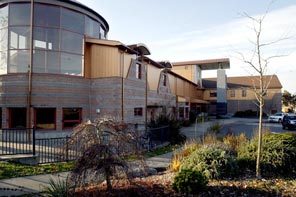Excerpt From an Open Letter to Arne Duncan from Herb Kohl
We have come far from that time in the '60s. Now the mantra is high expectations and high standards. Yet, with all that zeal to produce measurable learning outcomes we have lost sight of the essential motivations to learn that moved my students. Recently I asked a number of elementary school students what they were learning about and the reactions were consistently, "We are learning how to do good on the tests." They did not say they were learning to read.
It is hard for me to understand how educators can claim that they are creating high standards when the substance and content of learning is reduced to the mechanical task of getting a correct answer on a manufactured test." (Summer 2009)
Nova High School Relocated

Merit Pay
Laurie, in response to R. Weingartner, On Point, 1/26/10
Merit pay is an issue that is closely associated with charter schools and is a reiteration of the No Child Left Behind Act.
Basically, it requires that teachers pay be based on how well their students perform on standardized tests. For our students, it could be the new MAP test. With the No Child Left Behind Act, teachers and staff were pressured to teach much of the class work to the standardized tests. With so much focus on the test, many other parts of knowledge building, creativity and understanding of subjects and their synthesis with other knowledge had to take a back seat. For many students, teaching to a test meant that they were not able to reach their full potential which would have been far beyond the level of the tests.
No one wins in this situation.
Part of the fallout also is that if a teacher's pay is based on how well their students test, many teachers will want to teach in a school where they know that the students will perform well. Those schools are, for the most part, not the schools that are predominately minority in population.
Some students do not perform well on standardized tests for many different reasons and yet a teacher's pay can be tied to that student's performance. High stakes testing also puts pressure and stress on the students who become burdened with the thought that they need to perform well on one test. The test becomes a focus with little opportunity to explore and have fun learning, creating and synthesizing new thoughts and ideas.
Update: The Governor of Texas has decided to opt out of the Race to the Top funding because of the ineffectiveness of the merit pay program that was in effect for three years inthe state.
Update: March 8, 2010 Principal to be removed from school in Wasington State due to low WASL scores.
What Is a Charter School?
A charter school can expel any student that it doesn't believe fits within its standards or meets its level of expectation in terms of test scores. If the student is dropped off the rolls of the charter school, the money that was allotted for that student may or may not be returned to the district at the beginning of the next year. That is dependent upon the contract that is established by each district.
Also, according to a recent (June 15, 2009) study by Stanford University's Center for Research on Education Outcomes (CREDO), charter schools do not necessarily perform any better than public schools. In fact, 37 percent performed worse. Forty-six percent demonstrated "no significant difference" from public schools. Only 17 percent of charter schools performed better than public schools.
Thomas Jefferson
The Broad Foundation
The Broad Foundation claims to be a philanthropic organization, created by billionaire Eli Broad.
The Broad Foundation supports privately run charter schools and actively develops a system of charter schools in urban areas.
Broad claims it engages in "venture philanthropy":
"Our Approach to Investing: Venture Philanthropy. We take an untraditional approach to giving. We don't simply write checks to charities. Instead we practice 'venture philanthropy.' And we expect a return on our investment."
Many of us have discovered the Broad Foundation's presence within SPS and are requesting an explanation for why it is here and what its' objectives are.
Seattle has three "Broad Residents", and two Broad graduates now working within SPS. One of them is our superintendent who is a graduate of the Broad Academy which trains superintendents, and is also on the Broad's Board of Directors.
Another Broad graduate and a onetime Broad resident in SPS, Brad Bernatek, is now Director of REA, Research, Evaluation and Assessment within SPS. That department is responsible for student statistics including enrollment, demographics, evaluation and standardized testing.
The Broad Foundation provided Dr. Payzant, also a Broad graduate, to be a part of our superintendent’s yearly review in 2009.
Broad recently gave SPS a $1M "gift." That money is now in the hands of the Alliance for Education and no one knows how the money is being spent.
All in all the Broad Foundation has been quite generous to the Seattle Public School system and as Eli Broad states himself, he expects a return on his investment.
Broad also supports and actively promotes mayoral control of school districts. Eli Broad's preferred model of mayoral control means that the mayor selects the school board members and superintendent who are therefore unelected and are beholden only to the mayor, not the people of the city. It then becomes a school district that is run by one person, the mayor, with heavy influence by the Broad Foundation through developed relationships with that individual.
Update: A Detroit School District employee found accepting money from the Broad Foundation.
"Let the games begin: Detroit Teachers vote to unanimously join the current Detroit Public School District in their suit against Robert Bobb".
Update: The Broad - Rhode Island connection.
Rhode Island has had the dubious distinction of making national news recently for the draconian firing/scapegoating of an entire school of teachers. Is it a coincidence that the new education commissioner for R.I., who is pushing the state to do whatever it takes to qualify for federal "Race to the Top" dollars, is a "Broad Superintendents Academy" graduate, Deborah Gist?
Dan Weil
Dollars and Sense
December, 2009
What the Gates Foundation Is Doing: The MAP Test
The Gates Foundation supports, and pays for, high stakes testing which is tied to merit pay.
The Bill & Melinda Gates Foundation has given Seattle Public Schools a total of $9M this year for additional testing. We have not been able to find out the details of this testing yet. We don't know what the test is, what the test is to determine, who is administering the test and how the results of the tests are to be used.
UPDATE: We have heard that the Gates "gift" is funding the new computerized, standardized "MAP" tests the district is administering this year to all students, from as young as kindergarten to grade 9. MAP stands for "Measures of Academic Progress™" (yes, it is a trademarked product) and will be administered to the kids three times during the school year. The test can take as much as two hours each session, according to the district's official announcement letter.
A number of questions come to mind: Is this the best use of the students' school time? Is it appropriate to make children as young as five who can't read take a standardized test on a computer? Is this the best use of such funds? Or would parents, students and teachers prefer to see money channeled more directly to the classroom, to create smaller class sizes, more enrichment opportunities, or to purchase new textbooks?
A SIDE NOTE: Another interesting connection is that our superintendent, Dr. Goodloe-Johnson, is on the Board of Directors for the company that has created and distributes the MAP test. There is $4.3M in the levy to pay for additional use of this MAP test in Seattle.
The Cooper Building: Program DIscontinued, 2009

Regarding Arne Duncan's Renaissance 2010
Most of the new experimental schools have eliminated the teacher union. The Commercial Club hired corporate consulting firm A.T. Kearney to write Ren2010, which called for the closing of 100 public schools and the reopening of privatized charter schools, contract schools (more charters to circumvent state limits) and "performance" schools.
Kearney's web site is unapologetic about its business-oriented notion of leadership, one that John Dewey thought should be avoided at all costs. It states, 'Drawing on our program-management skills and our knowledge of best practices used across industries, we provided a private-sector perspective on how to address many of the complex issues that challenge other large urban education transformations.'
Duncan's advocacy of the Renaissance 2010 plan alone should have immediately disqualified him for the Obama appointment."
Henry Giroux & Kenneth Saltman,
Obama's Betrayal of Public Education?
Truthout
The African American Academy: Closed 2009

Alternative Schools in Seattle
At this time, the alternative and nontraditional schools in Seattle are basically under siege. Many schools have been closed, marginalized or split apart, including the Accelerated Progress Program (APP) for highly gifted kids, the Center School, Nova, Summit, the African American Academy, SBOC and AS-1. There is also a plan for an Alternative School Audit by SPS in October, 2009.
We see these alternative programs as viable options to the traditional school approach to education. For this reason many of us believe that with the support of these programs, there is no need for privatized charter schools.
Governor Gregoire and our state representatives are speaking to Arne Duncan about our alternative schools and that they meet the requirement of charter schools and should be considered in providing Race to the Top funds to our state.
Summit K-12: Closed 2009

An alternative school
Please Note
Meg Diaz, a parent, did a brilliant presentation to the school board in January regarding the school closures, the demographics of Seattle and why it didn't make sense to close the schools.
See: http://sites.google.com/site/seattleschoolsgroup/meg-diaz-analysis
Unfortunately, the school board paid no attention to Ms. Diaz or their own reports and instead chose to believe the numbers presented by the superintendent's CFO, Don Kennedy who previously worked with our superintendent in Charleston, and Brad Bernatek our Broad graduate and Director of REA, Research, Evaluation and Assessment who also handles the demographic data for SPS.
Two schools were closed that, per their own report, would see an increase in school aged children of anywhere between 31%-100% between 2008 and 2012. See page 11 of the DeJong report titled "Seattle Public Schools: Enrollment Projections Report". Those two schools were TT Minor Elementary School and Meany Middle School.
After the closures, Ms. Diaz decided to investigate the administrative cost within the Stanford Center and came up with surprising results. While the superintendet was rifing teaches and staff and closing schools, staff was growing within the Stanford Center and particularly in our superintendent's office where yet another Broad graduate was hired as one of the superintendent's administrative assistants.
Posted on October 6, 2009: The new assignment plan just came out and the proposal is to re-open five school buildings. Between closing five school buildings, shuffling students to different schools and now proposing the re-opening of five buildings within a year's time speaks volumns about the lack of competency of our superintendent and her chosen staff.
We have now wasted money closing five schools, moving students, equipment and materials around just to re-open five school buildings.
The cost of re-opening five of these buildings is as follows:
Sand Point: $7M
Viewlands: $11M
Old Hay: $7.5M
Mc Donald$: $14.9M
Rainier View: $7.4M
Total so far: $47.8
The superintendent, along with the school board, plan to take the next capitol levy money, BEX III, to be voted on in 2010 that was to go to the maintenance and seismic upgrades of our school buildings, which would make them safer, and instead use the money to re-open these previously closed buildings.
The decision to close schools last year and close or relocate programs came down from our superintendent's office quickly and there was little time for debate or understanding of what the ramifications would be. It is my opinion that again, we need to have time to evaluate what cost can wait and how these cost can be phased so that we can not only make our existing buildings safer but also provide adequate space for all of our students.
There is also stimulus money that other school dristricts have been able to acquire to upgrade their school buildings through FEMA grants. These grants, part of a Disaster Mitigation Fund, are being used to make school buildings safer. I had presented this information to the school board and superintendent but no action was taken at the time.
I will provide updates on the effort to once again get SPS to pay attention to this opportunity.
Please send comments or ideas to us or share your opinions below. We want to hear from you. All positive and constructive input is of value.
DT
Priscilla Gutierrez, Huffington Post comment
Lowell Elementary

The Lowell APP program was split with half of the students sent to Thurgood Marshall.
Our Declaration
In the current national discussion about education reform, the loudest voices are not necessarily those of the people who are directly affected by what happens in our schools – the students, parents, teachers and school communities themselves.
We are parents with children in public schools. These are our kids, their teachers, our schools. And we would like to be heard.
What’s more, the message coming from the current league of reformers is largely negative, much talk about what’s wrong with our schools, but little discussion of what public schools and teachers are doing right, and what they could do even better if given full support.
Can our public schools be improved? Absolutely. But that begins with fully funding our schools and believing they can work.
We believe they can, when given the chance.
We also believe that too many of the latest proposed education reforms are too punitive and are not changes for the better.
We believe there are valuable aspects of public education worth preserving and supporting, beginning with the very principle itself – free public education for every child in the country. We believe this has always been a noble goal and one that we’re not willing to give up on.So we have created a Declaration of Support for Public Schools.
We invite others across the nation who share our vision for public education to sign on to our statement, to send a message to the president, education secretary and school district officials throughout the country.
The message is simple:
Let’s fix what’s broken, but don’t break what isn’t.
And do not impose detrimental changes on our schools and children in the name of “reform.”
Sincerely,
Sue Peters, Dora Taylor
Seattle Public Schools parents
May 2010
Tuesday, May 18, 2010
Dr. Goodloe-Johnson’s Evaluation, The People Have Spoken
My favorite part were the comments. There were many so I am just going to select about one quarter of them to post.
Does not reflect the values of our community. Makes no attempt to understand our individual communities. Regularly undermines the strong parts of our system to help mask the weaker components. That might almost make sense if it truly helped the kids who struggle, but in practice it hasonly allowed her to decrease the resources that are devoted to our most vulnerable kids.
X for All (Our supe’s motto, “Excellence for All”) is applied to mean whatever is convenient. Imposes ‘data based’ decision making on schools when they have little meaningful data to work w\ (WASL not designed to be used that way, sample sizes for subgrps too small)not at District level where much data is possible. Audits are cherry picked,results applied to suit her goals, not to follow best practices.
As a teacher, I’ve been distressed every time I see her talk — she seems to have no clue as to what is going on in the schools.
Dr GJ is dismissive and contemptuous of parents’ and community input. Her vision for SPS is piecemeal and unclear. Her execution has been extremely incompetent, as evident by the closing of 5 schools in one year and reopening 5 schools the very next year at great expense; her office seems incapable of getting information to the Board timely enough for informed votes. Her quote that a competent teacher can differentiate math instructions to 28-32 students shows that she has no experience in teaching.
She seems to dwell in the shadows, hear very little from her, she rarely speaks to parents at meetings, and everything seems carefully orchestrated.
As a new parent to Seattle schools, I am less than impressed. She doesn’t reach out to parents.
My child, a special ed student, is not being educated to his highest potential, nor is he having his many needs met, under the current superintendent’s reign. The superintendent should be deeply ashamed about how special education students are being “handled” in this district. The superintendent is a disgrace to our children, and to Seattle.
Dr. Goodloe-Johnson seems more intent on forcing high-stakes testing and merit pay than on finding what really improves student learning.
When Dr. Goodloe-Johnson arrived, district administration was not in good shape, but many schools were functioning quite well under benign neglect. If she had decided to not mess with success and put her attention on specific schools and areas that were hurting, I’d have been happy. Her actions seem aMachiavellian power grab, mucking with successful schools (e.g. a hurried attempt to move Thornton Creek) and speaking all the right buzzwords and platitudes. She’s smart, but I don’t trust her.
When her contract ends, send her packing. She has been an unmitigated disaster.
She disregards community input and professional studies. She wastes resources of the district. She is repeatedly dishonest and unapologetic. She doesn’t appear to care about kids. Not SpEd, Bilingual, highly capable, low SES or even typical children.
She is re-segregating the district.
Teachers fear personal retaliation for speaking up for students’ needs. She has no commitment to Seattle. This job appears to be a professional stepping stone, yet her actions here will have lasting repercussions.
At a community meeting I attended she dismissed parent input (about discovery math) and immediately afterward fawned over a student comment on the same topic. I am especially concerned that school-specificprograms will not be continued in future.
Supt. Goodloe-Johnson is autocratic, condescending, and dismissive of parent and community input into SPS decision-making. Decisions get handed down in a summary fashion, often without notice that decisions are going to be made — and then opposition from the public is dismissed with contemptuous comments, without any recognition of the stake we all have in our public schools. It is time for her to go.
She fails on all of the criteria central to her evaluation by the Board.
Terrible at communication, especially with parents. Goals are not well-defined.
She lied to parents at TT Minor about not closing the school.
In focusing mainly on bringing up the lower-performing schools and students, Dr. Goodloe-Johnson is going to succeed in equalizing the system by bringing down the higher-performing schools and students. She seems to have a hidden agenda of dismantling the alternative schools but is not putting this out as a goal for the public to see and fight against.1) The lack of a real transition plan has been immensely frustrating. Siblings should have been guaranteed a spot at the school the older sibling attended. 2) She closed schools then opened schools. Should have been open with the public to begin w/ that they just wanted to close bad schools. That Icould swallow but opening schools with FEW students in a bldg when we have a budget crisis=bad idea!3) she needs to do a better job proactively communicating w/ families.Dump her and anybody with her mindset. The sooner the better.I don’t get the impression at all that families are heard by the district. Between math issues, the new SAP, and the general attitude toward any sort of program that even remotely falls outside a standardized test norm, engagement seems poor. I’m not also not thrilled with how they want to evaluate teachers.
How about equip teachers with the tools they need (smaller classes, more help IN THE SCHOOLS with REAL professionals targeting struggling kids, not “teaching coaches” in central office.)
Supt. G-J has been a disaster for Seattle. She has made very ethically and fiscally questionable decisions, many by fiat. She clearly has nothing but disdain for parents & teachers of SPS, & she spends money erratically. Why does she find $4.3M for burdensome MAP tests, but no $ to pay for elem. counselors or librarians? How can she work for SPS AND remain on the boards of the co. (NWEA) that sells MAP to SPS, & L.A. billionaire Eli Broad’s pro-charter foundation? Who is she really working for?
Strategy? I don’t see any strategy, just reaction. Ignores community input completely. No evidence schools have improved. Staff hates her, principal churn is unacceptable.
#5. No way. Fire her.
I believe her principal concern is to close schools and implement the School Assignment Plan. Her priorities should have been to (A) inspire confidence to draw parents back into the system (B) to achieve better socioeconomic integration within schools (C) to close schools fairly, avoiding disproportionate impacts on the south end.
This is just a sampling. Looking back on the time that I have been in Seattle and gotten to know our supe, I would say that she came here with an agenda that had nothing to do with our city or our communities. It was not an agenda developed from listening to the neighborhoods and finding out really anything about our town, It all had to do with doing the bidding of the Broad. That has become painfully obvious not only to me but to many others.
She really does need to go. She has been of no value to our children or our community.
Dora








No comments:
Post a Comment